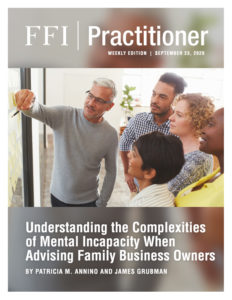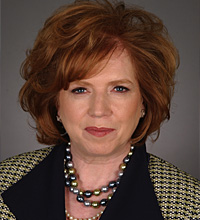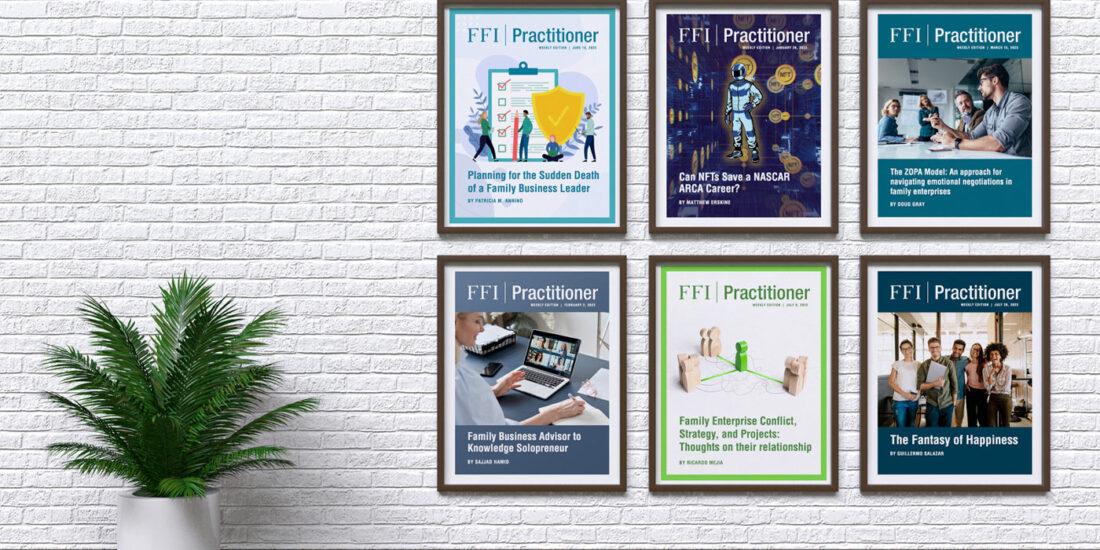
View this edition in our enhanced digital edition format with supporting visual insight and information.
Thank you to this week’s contributors, Patricia Annino and Jim Grubman, for concluding our series of articles by presenters at the virtual 2020 FFI Global Conference, October 26-28. In their article, Patricia and Jim address the importance of planning for the potential diminished capacity of family enterprise owners.
Death is inevitable. Diminished capacity in the years prior to death may not be, but it is common enough that families and family enterprises need to prepare for what may be a significant risk. Particularly with today’s aging global population and increased lifespans, diminishing capacity is a foreseeable problem that responsible families, enterprises, and consultants should be anticipating and creating plans to address.
A Tough Problem to Approach
Why don’t family enterprises make planning for diminishing capacity a priority? Is it because they would rather not worry about it today, as there is always tomorrow? Some founders may prefer to accept planning for an inevitable death but not for a possible decline beforehand. Certainly for families, addressing this issue is inherently complicated for everyone involved.
Of greater concern is that family business advisors rarely bring up planning for diminished capacity as frequently as they should. Compared to other commonly-addressed risks to the family and the enterprise (death, divorce, out-of-date governance or documents, lack of liquidity, lack of proper estate planning, and lack of succession planning, to name a few), risk management for diminished capacity often lags. Several rationalizations prevent making this “maybe someday” issue a “do it today” issue:
- If the question is brought up, it does not grab the attention of the owner. Procrastination kicks the can down the road.
- “Family enterprises don’t want to pay for that planning.”
- “I’m unsure what it entails and how to think about it.”
- Addressing potential or current incapacity requires multidisciplinary understanding and the creation of a multidisciplinary team, which may be difficult or expensive to implement.
- Many advisors and families believe the standard clauses in their enterprise’s legal documents are sufficient to handle the issue, should it arise.
- Many families are unfamiliar with and yet terrified about diminished capacity in a strong, historically capable, and perhaps domineering elder. Relying only on what they have seen in movies or read in articles, they believe relevant medical and legal knowledge is relatively new and perhaps contradictory. Families have few models to demonstrate that the issues can be resolved quickly or without conflict.
In truth, the fields of law or medicine independently provide only a partial roadmap for addressing the complexities of mental incapacity in modern family enterprises. Overshadowing the legal and medical approaches are fiduciary, shareholder, family, and ethical responsibilities, all of which an experienced family business consultant must understand. Any plan put in place can provide only a broad framework for the circumstances that may lie ahead when reality hits. Yet ultimately, family business consultants must develop the competencies to know what to do and how to raise the issues effectively with their clients.
A Complex Situation with Unique Qualities
The most difficult phase of dementia is its onset. When an owner’s capacity diminishes, the crisis can have a long, slow initial deterioration as abilities and insight dissipate.
Often, capacity ebbs and flows, sowing confusion for everyone involved. It is very difficult to address diminishing capacity with a person who may be slipping. Emotionally, it is human nature to cover one’s weaknesses whenever possible, so minimization and excuses are frequently encountered. Cognitively, it is the nature of dementia that self-awareness and judgment are often early casualties. These are more deadly losses than the obvious impairments of memory or language. Denials of any deficits may be just as increasingly hard-wired in brain functioning as in any emotional lack of acceptance.
Apart from the individual at the center, it is human nature for those around the elder to deny seeing someone’s decline until the evidence is truly undeniable. It is also very difficult to grant someone dignity and autonomy while recognizing they may be increasingly impaired in decision-making, with positions and livelihoods in the balance. Sorting through the complex symptoms and possible causes is often overwhelming for anyone not professionally trained in neuropsychological assessment – in other words, everyone in the family and the family enterprise, as well as their advisors.
Getting a neuropsychological evaluation can be helpful, but it may be neither easy nor conclusive. Sometimes if elders are competent enough, they will fight the attempt to be evaluated or have their control taken away – and they may prevail, sometimes with retaliatory consequences. When an evaluation does occur, the findings can make things murkier instead of clearer. A determination of borderline capacity today may be very different than six months from now. As a result, law, medicine, and effective business management may not align. There is a judicial bias toward presuming competence, so when the issues do end up in court, judges will frequently look to the medical evidence before taking away someone’s independence. Unfortunately, medical experts may disagree on what capacity means and what functions the business owner is still capable of performing.
When no advance planning is in place, effective action is still possible but much trickier. It calls upon everyone to work together with empathy, skill, good judgment, and a commitment to the best possible solution for the system under the circumstances. From the legal side there are conflicts around who the client is (the owner? the business? the shareholders?) and whether the owner should have separate counsel, for example. There are privacy and fiduciary issues: Who has the right to know about the decline or the assessment findings, and whose obligation is it to report it to the management team or other owners? There are management and succession issues: Who is authorized to take over, upon which triggering mechanisms? What should or must the Board of Directors do? Hovering over all these dilemmas is one question dictated by the values of the system: What is the right thing to do, ethically?
A Difficult Situation Requiring Advance Planning and Risk Management
Obviously, despite all the obstacles, avoiding this disaster requires being proactive. Like other foreseeable problems, risk management should be prioritized over crisis management. Planning well in advance of any capacity issues includes multiple elements, implemented in concert:
- Putting the proper legal provisions and documents in place
- Putting proper succession documents in place
- Ensuring the best people are named in fiduciary capacities
- Ensuring that, when the time comes, everyone will be able to do what they are supposed to do
Advance planning must include a mechanism by which someone’s diminishing capacity can and will be evaluated. This includes who will do the evaluation, what the evaluation will entail, and what triggers will shift control, based on the findings. Discussing ahead of time the logistics of an evaluation and the possible outcomes helps everyone prepare for the ethical, privacy, fiduciary, and emotional issues that often arise. Proper planning helps reduce many of the fights in family enterprises that occur particularly during the assessment and implementation phase.
Facing the Risk, Like Any Other
We all know the time to plan is when there is no need to plan. We also know that being proactive is hard – for us and for our clients – because there is always some other issue more pressing. Yet with modern increases in longevity, family enterprises and their advisors must address the inevitable risk of an owner’s diminishing capacity. And they must do so with the same level of attention, thoughtfulness, and intelligence they bring to the other risks a family business faces.
Disclaimer: The views expressed in this article are those of the author only. The information contained in this article is provided solely for informational purposes. This article does not constitute legal advice or create an attorney-client relationship. Because of the generality of this article, the information provided herein may not be applicable in all situations or in all jurisdictions and should not be acted upon without specific legal advice from a licensed attorney based on particular situations.
About the Contributor

Patricia M. Annino is an attorney with Rimôn, P.C. in Boston. A former member of the FFI board of directors, a founding member of the 2086 Society, and a frequent contributor to FFI Practitioner, she has been voted by her peers as one of the Best Lawyers in America, Estate Planner of the Year and EuroMoney’s “Best in Wealth Management — USA.” She will co-present “Understanding the Complexities of Mental Incapacity When Advising Family Business Owners” at the October 26-28 FFI virtual global conference this year.

James Grubman, FFI Fellow, is an internationally recognized consultant to families of wealth, to family businesses, and to the advisors who serve them. He is the author of Strangers in Paradise: How Families Adapt to Wealth Across Generations, and co-author of Cross Cultures: How Global Families Negotiate Change Across Generations. He will co-present “Understanding the Complexities of Mental Incapacity When Advising Family Business Owners” at the October 26-28 FFI virtual global conference this year.

View this edition in our enhanced digital edition format with supporting visual insight and information.





